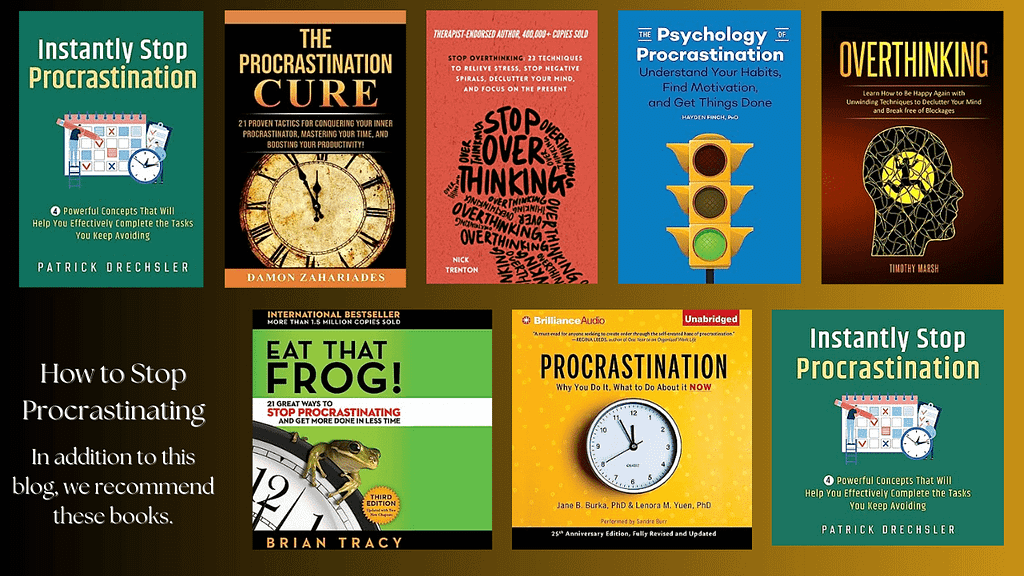


Procrastination: 10 Powerful Ways To Conquer It
Do you ever find yourself scrolling through social media mindlessly, even when you have a looming deadline? Or maybe you find yourself constantly “just one more episode-ing” a show, pushing important tasks further down your to-do list? If so, you’re not alone. Procrastination, that infamous thief of time, plagues millions of people worldwide. It can subtly steal your focus, derail your progress, and leave you feeling overwhelmed and unproductive.
This constant battle with procrastination can be incredibly frustrating. Important goals start to feel unreachable, and the guilt of wasted time can add another layer of stress. But there’s good news! Procrastination isn’t an inherent character flaw; it’s a behavior that can be overcome. In this blog post, we’ll explore 10 powerful strategies specifically designed to help you conquer procrastination and finally achieve what you set out to do. With the right mindset shifts and actionable tactics, you can reclaim control of your time, boost your productivity, and watch your goals become a reality.
Tip #1: Get Clear on Your Why
Moreover, one of the most effective ways to combat procrastination is to get clear on your why. It’s challenging to stay motivated when you lack purpose and clarity. Before tackling any task or project, take a moment to understand why it’s important and how it fits into your big-picture goals. Connect it to something personally meaningful that drives you.
Understanding the deeper ‘why’ behind your actions provides the inspiration needed to follow through and overcome procrastination. When you know why a task matters, you’re less likely to let vagueness lead to ambivalence and delay. Define what completing this task represents to you. This clarity will make you crave the satisfaction of seeing it done, helping you to procrastinate no more.
- Purposeful Connection: Before diving into that project, pause. Ask yourself: Why does this matter? Connect it to your big-picture goals. Is it a stepping stone toward your dream career? A contribution to your community? When you see the purpose, motivation ignites.
- Personal Meaning: Make it personal. How does this task align with your values? Does it resonate with your passion? When you infuse meaning, procrastination retreats.
- The Deeper ‘Why’: Dig deeper. Beyond the surface, what does completion represent? Freedom? Growth? Impact? That’s your inspiration—the fuel to follow through.
- Banish Vagueness: Ambiguity breeds procrastination. Define what “done” looks like. Visualize it. Crave it. Let vagueness dissolve.
Remember: Your ‘why’ is your compass. When procrastination knocks, let purpose guide you.
Tip #2: Overcome Procrastination By Breaking Down Big Tasks
Procrastination Buster: Mini-Milestones
In fact procrastination often occurs when faced with big, intimidating projects. These large tasks are easy to push back, contributing to ongoing procrastination. To overcome procrastination, break the task into smaller, more manageable pieces. This approach makes the task feel less overwhelming and more approachable.
First, outline the subtasks and order them logically. Next, focus on completing the first step before moving on to the next. This step-by-step method prevents you from feeling overwhelmed. For example, if your project is to write a report, start with an outline, then write the introduction.
Using this method creates a sense of progress as you complete each mini-milestone. Additionally, checking off smaller accomplishments propels you forward faster. By breaking down big tasks, you transform a daunting project into a series of achievable steps.
Moreover, this strategy boosts your confidence and reduces the urge to procrastinate. As a result, you stay on track and complete the overall project more efficiently. Overcoming procrastination becomes easier when you see consistent progress.
- Subtask Blueprint: Take a deep breath. Break the project into mini-milestones. outline subtasks—like assembling puzzle pieces.
- Logical Order: Arrange the pieces. What comes first? Second? Third? Logical order is your compass.
- Step 1 Focus: Forget the whole mountain. zoom in on Step 1. Begin. Chunk away. Progress fuels momentum.
- Checklist Triumph: As you complete each piece, check it off. Celebrate small victories. The sense of progress propels you forward.

Tip #3: Leverage Accountability to Beat Procrastination
Harness Accountability to Crush Procrastination
At any rate, procrastination decreases significantly when we are accountable to others. Enlist an accountability partner to help you stay focused and committed to stopping procrastination. Knowing you have to answer to someone else creates healthy time pressure.
Set clear milestones and ensure there are reasonable consequences if you miss them. Genuine accountability fosters results and reduces excuses. When someone else is counting on you, you’re more likely to stay on track and complete your tasks.
Having regular check-ins with your accountability partner can keep you motivated. This support system can make a significant difference in overcoming procrastination. So, leverage accountability and see how it transforms your productivity.
Tip #4: Optimize Your Peak Productive Hours
Procrastination Buster: Time Your Triumph
Understanding your natural energy rhythms is crucial for effective time management and overcoming procrastination. Analyze when you’re at your sharpest mentally and most motivated. Is it early morning? Late at night? Identify these peak hours.
In short, block off these times for your most challenging priorities. Schedule less brain-intensive tasks for periods when you naturally drag. By aligning your schedule with your biological prime time, you can maximize productivity and get important things done efficiently.
Knowing your peak productive hours helps you tackle demanding tasks when you’re most capable. This strategy reduces procrastination and enhances overall performance. Use your natural energy highs to your advantage and see a significant improvement in task completion.
Remember: Timing matters. Ride your peaks, glide through valleys.
Tip #5: Stop Procrastination By Eliminating Distraction
Procrastination Buster: Distraction Detox
Basically, every dinging app and alert is an invitation to stray off course. To stop procrastinating, eliminate distractions in your workspace when it’s time to focus. Silence phone notifications, close extra tabs, turn off social media, and hide chat apps.
In the meantime, consider using distraction-blocking apps that lock certain sites during work periods. Declutter your environment to minimize temptation triggers. A clean and organized workspace supports better concentration and productivity.
Effective focus requires removing anything that enables you to drift. By creating a distraction-free environment, you can concentrate on the task at hand and significantly reduce procrastination. Take control of your surroundings to enhance your ability to get things done.
Tip #6: Set Time Limits to Beat Procrastination
In general, open-ended tasks with no hard deadlines often lead to procrastination. To counter this, impose finite time chunks using timers or apps like Focus Keeper. These tools encourage you to work in concentrated bursts with short breaks.
In any case, the pressure of a ticking timer can tap into your competitive side, pushing you to stay focused. As a result, setting time limits with rewards for completing focused sprints prevents indefinite delays. This method helps you manage your time more effectively and reduces the tendency to procrastinate.
On balance, using time limits turns overwhelming tasks into manageable segments. By doing so, you create a structured approach to productivity and make steady progress towards your goals.

Tip #7: Compartmentalize Large Projects to Prevent Procrastination
To put it differently, big, complex projects can feel overwhelming and lead to procrastination. To maintain momentum, compartmentalize these projects into distinct stages spread over multiple sittings. Complete one portion fully before moving to the next component later.
As a result, this approach creates mini-deadlines and urgency around smaller milestones. By breaking large tasks into steps, you generate more opportunities to celebrate your progress. This strategy helps in stopping procrastination by making large projects feel more manageable and less daunting.
Compartmentalizing projects not only makes them more approachable but also keeps you motivated as you complete each milestone. This way, you can consistently move forward without feeling overwhelmed.
Tip #8: Celebrate Milestones and Track Your Progress
Conquer procrastination by harnessing the power of accomplishment. When you complete a task, your brain releases dopamine, a neurotransmitter that boosts mood and motivation. To leverage this natural reward system, track your progress and celebrate hitting mini-milestones. This will keep you engaged and motivated to move forward.
- Utilize tracking apps to visualize your progress as tasks get checked off your list.
- Maintain a progress journal to document your productive days and reflect on your achievements.
- Consider sharing your wins on social media. Publicly acknowledging your accomplishments can be a motivating factor, but avoid bragging or excessive self-promotion.
Tip #9: Crush Procrastination with a Powerful Morning Routine
A structured morning routine sets the tone for a productive day and combats procrastination. When your mornings lack direction, it’s easy to fall into the trap of putting things off. Here’s how to design a routine that primes you for success:
- Wake up at a consistent time: This helps regulate your sleep cycle and promotes overall well-being.
- Hydrate: Starting your day with water improves focus and alertness.
- Move your body: Exercise releases endorphins, natural mood elevators that can combat procrastination.
- Fuel your brain: Eat a nutritious breakfast to sustain your energy levels.
- Sharpen your mind: Consider meditation or journaling to gain clarity and focus.
- Prioritize your tasks: Review your top 3 Most Important Tasks (MITs) for the day. This sets your intentions and motivates you to tackle them.

Tip #10: Reward Smart, Not Just Hard
Solidify your newfound productivity by strategically rewarding yourself. After conquering a challenging task, indulge in a reward you’ve been looking forward to. This reinforces positive habits and trains your brain to associate hard work with gratification.
Here are some tips for effective reward strategies:
- Match the reward to the accomplishment: A bigger reward can celebrate a major milestone, while smaller treats can incentivize completing smaller tasks.
- Focus on experiences over possessions: Consider activities you enjoy, like reading a chapter of your favorite book, taking a walk in nature, or spending time with loved ones.
- Avoid instant gratification: Don’t reward yourself with activities that might lead back to procrastination, like excessive social media browsing or mindless TV watching.
- Plan your rewards in advance: Knowing what you’ll get after completing a task can be a powerful motivator.
By following these guidelines, you can leverage rewards to overcome procrastination and maintain momentum toward your goals.
FAQs: Overcoming Procrastination Struggles
Q: Why do I procrastinate even when I know I shouldn’t?
A: Procrastination is often driven by emotions rather than logic. You may put off tasks because they feel daunting, tedious, or overwhelming. Or you focus on easier quick rewards at the moment over long-term gains. Identifying core reasons like boredom, anxiety, or distraction and addressing those needs can help stop the cycle.
Q: What if I try these anti-procrastination tips but still can’t stop procrastinating?
A: Changing any habit takes repetition, patience, and self-compassion. If these tips aren’t working, try isolating the 1-2 ideas that resonate most and truly commit to those. Getting support from others also helps. But don’t give up – every step to reduce procrastination brings you closer to your goals.
Q: How long does it take to break a chronic procrastination habit?
A: Consistency over time is key. While you may get short-term relief, most experts recommend sticking with new anti-procrastination tactics for at least 30-90 days to cement change. This gives your brain time to wire new neural pathways. Stay diligent through slip-ups, and you’ll get there.
Conclusion
Procrastination Doesn’t Have to Hold You Back
Take control of your time and achieve your goals by overcoming procrastination. These 10 proven techniques empower you to break free from the cycle of putting things off. By incorporating self-awareness, routines, boundaries, and rewards into your daily life, you can silence the urge to procrastinate and channel your energy into purposeful action.
Remember, progress over perfection is key. Don’t wait until everything is perfectly aligned to take action. Start small, celebrate your wins, and keep moving forward. With consistent effort and the strategies outlined here, you’ll be well on your way to achieving your full potential.
